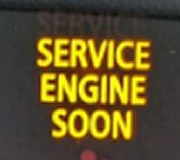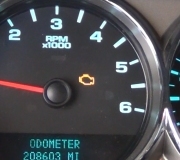The first thing is to read and record the diagnostic fault code. Simply erasing them doesn't fix anything. You'll lose that valuable information. The people at most auto parts stores will read the codes in Engine Computers for you for free, but be sure to find out the exact code number. When you know that, you can go here:
https://www.2carpros.com/trouble_codes/obd2/p0600
to see the definition, or I can interpret it for you.
Be aware too that fault codes never say to replace a part or that one is bad. They only indicate the circuit that needs further diagnosis, or the unacceptable operating condition. When a part is referenced in a fault code, it is the cause of that code only about half of the time.
From your dandy observations and the symptoms, I have a suspicion the connector on the engine coolant temperature sensor is making intermittent contact between one pair of mating terminals. Often a temporary solution is to just unplug it and plug it back in. The scratching action on the terminals can clean them up enough to make a good contact for a while. That will at least prove we're in the right area, but the better solution is to remove the terminals so they can be squeezed a little tighter. Also look for evidence of corrosion on those terminals. If you find that, the better solution is to replace the sensor and the plug. That's because the terminals are too small to get in there and clean them effectively.
Your car brand and model didn't show up, but in general, on a vehicle as new as yours, there is no longer a separate coolant temperature sensor for the dash gauge and another one for the Engine Computer. Most now use just the one for the computer, then the computer supplies the information to the instrument cluster, which is now another computer, then that interprets the information to set the position of the gauges. The sensor for the computer will always have two wires. When older cars had a separate sensor for the gauge, that one always had just one wire going to it.
Coolant temperature sensors are pretty reliable because there's just one component inside them. That's why corrosion and loose terminals are better suspects. When the Engine Computer detects a problem with the sensor circuit, it can't know if the engine is overheating, and in response, if you have an electric radiator fan, it will turn that on continuously, and it is likely to disable the air conditioning system. The AC system dumps the heat it removed right in front of the radiator. That puts a really high load on the cooling system. The computer wants to lessen that load to help cool the engine and keep it at a safe temperature. That's why you'd get the message "No AC". That tells the mechanic to not waste his time and your money diagnosing the AC system. It is working okay. The Engine Computer turned it off for a reason, and it's that reason that has to be diagnosed.
I should point out that you should not do my suggestion yet of unplugging the sensor. Wait until the problem acts up again and gives you the "No AC" message. Once that occurs, it is okay to unplug the connector and reconnect it as a test. Even if it solves the problem for now, the diagnostic fault code will remain in memory for a period of time so you can have it read. On Chrysler products, for example, if the intermittent problem doesn't act up again, fault codes self-erase after 50 engine starts. Some safety systems, such as computers for air bags and anti-lock brakes retain codes in memory indefinitely until they're erased by the mechanic. We still want to know the code number so we can tell if we're on the right track.
Saturday, April 27th, 2019 AT 9:53 PM




